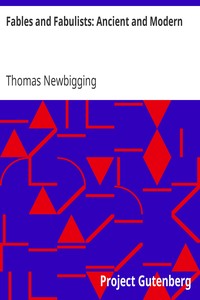Fables and Fabulists: Ancient and Modern by Thomas Newbigging
"Fables and Fabulists: Ancient and Modern" by Thomas Newbigging is a collection of essays and analyses on the classic genre of fables, written in the late 19th century. The work explores the definition, characteristics, and moral applications of fables, focusing particularly on the contributions of famous fabulists like Æsop. It proposes that fables serve not only to entertain but also to provide moral instruction, illustrating human behavior through animal characters. The opening
of the book presents a detailed discussion about the definition and nature of fables, distinguishing between traditional myths and the more rational form of fable epitomized by Æsop’s tales. Newbigging argues that fables are fundamentally moral narratives that use the speech of animals to convey human virtues and follies, engaging readers of all ages while imparting life lessons. He emphasizes the importance of fables in literature and their role as a means of indirect social commentary, setting the stage for an exploration of other notable fabulists throughout history in the subsequent chapters. (This is an automatically generated summary.)
Read or download for free
| How to read | Url | Size | |||
|---|---|---|---|---|---|
| Read now! | https://www.gutenberg.org/ebooks/42761.html.images | 309 kB | |||
| EPUB3 (E-readers incl. Send-to-Kindle) | https://www.gutenberg.org/ebooks/42761.epub3.images | 550 kB | |||
| EPUB (older E-readers) | https://www.gutenberg.org/ebooks/42761.epub.images | 553 kB | |||
| EPUB (no images, older E-readers) | https://www.gutenberg.org/ebooks/42761.epub.noimages | 170 kB | |||
| Kindle | https://www.gutenberg.org/ebooks/42761.kf8.images | 1.1 MB | |||
| older Kindles | https://www.gutenberg.org/ebooks/42761.kindle.images | 1.1 MB | |||
| Plain Text UTF-8 | https://www.gutenberg.org/ebooks/42761.txt.utf-8 | 218 kB | |||
| Download HTML (zip) | https://www.gutenberg.org/cache/epub/42761/pg42761-h.zip | 548 kB | |||
| There may be more files related to this item. | |||||
Similar Books
About this eBook
| Author | Newbigging, Thomas, 1833-1914 |
|---|---|
| Title | Fables and Fabulists: Ancient and Modern |
| Credits |
Produced by David Edwards, Stephen Blundell and the Online Distributed Proofreading Team at http://www.pgdp.net (This file was produced from images generously made available by The Internet Archive) |
| Reading Level | Reading ease score: 63.9 (8th & 9th grade). Neither easy nor difficult to read. |
| Language | English |
| LoC Class | PN: Language and Literatures: Literature: General, Criticism, Collections |
| Subject | Fables -- History and criticism |
| Subject | Didactic literature -- History and criticism |
| Category | Text |
| EBook-No. | 42761 |
| Release Date | May 21, 2013 |
| Copyright Status | Public domain in the USA. |
| Downloads | 584 downloads in the last 30 days. |
| Project Gutenberg eBooks are always free! | |

